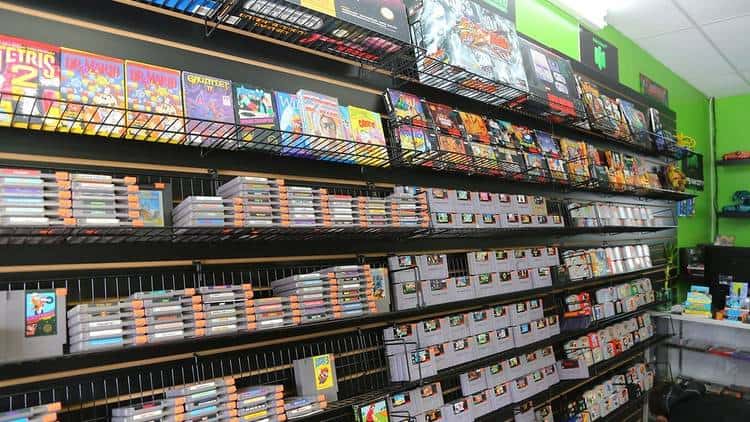Welcome to the Ultimate Parent’s Guide to Game Shops
Hey there, awesome parents! Stepping into the vibrant and exciting universe of game shops can be both thrilling and a bit overwhelming. Don’t worry, though; whether you’re trying to keep up with your kids’ interests, finding the perfect birthday present, or simply aiming to understand the gaming world a little better, you’re in the right place!
Today, I’m going to be your cheerful guide to the digital wonderland of video games, consoles, and accessories that game shops have to offer. We’ll explore the variety of choices out there and how to make informed decisions that put smiles on your little ones’ faces while ensuring they’re engaging with age-appropriate content.
Understanding Game Ratings
First things first: Let’s talk about game ratings. Knowing the rating system is the bread and butter of purchasing the right games for your children. In many countries, the Entertainment Software Rating Board (ESRB) rating system is the standard for video games, similar to how films have PG or R ratings.
- EC (Early Childhood): These games are safe for little tykes! They contain no inappropriate content.
- E (Everyone): Just like a G-rated movie, these games are fun for everyone.
- E10+ (Everyone 10 and older): These titles might have a little more action or slightly more complex themes.
- T (Teen): Think of these as your PG-13 movies. Suitable for teens, not so much for the little ones.
- M (Mature): These are the R-rated games, typically for gamers aged 17 and up.
- A (Adults Only): You’ll want to steer clear of these for your kids – they’re for adults, and they mean it!
Always check the rating on the game package or online description before making a purchase. It’s a quick and foolproof way to ensure the game is suitable for your child’s age range.
Finding the Perfect Game Shop
Now that you’ve got a handle on game ratings, let’s talk about where to hunt for these treasures. Game shops come in all shapes and sizes, from large chains to local favorites. Here’s what to consider:
- Big Brand Retailers: You’ve got your well-known stores with expansive selections. These often have excellent return policies and frequent sales.
- Local Game Stores: Supporting local business is fantastic, and these shops often have knowledgeable staff who love to chit-chat about their favorite games. They might also host game nights or tournaments!
- Online Retailers: Searching for convenience? Online shopping might be your best bet with reviews at your fingertips and often better prices.
Whether you’re popping into a brick-and-mortar store or clicking through a virtual catalog, always keep an eye out for customer reviews. They are a shining beacon when choosing the right games, offering insight into user experiences and potential issues.
Engaging with Your Child’s Gaming Interests
Engaging with your child’s gaming interests can be an incredible bonding experience. Try these tips:
- Play Together: Some games are specially made for co-op play, so why not jump in? You’ll get a peek into the gaming world and spend quality time together.
- Ask Questions: Show interest in their gaming hobbies by asking questions. What do they enjoy about the game? Who are their favorite characters?
- Learn the Lingo: Pick up some gaming terms to impress them and join in their conversations. Words like “DLC” (downloadable content), “FPS” (first-person shooter), and “RPG” (role-playing game) will make you an instant hero!
Remember, being involved doesn’t mean you need to be a gaming expert. It’s all about showing enthusiasm for what your child loves and ensuring they’re making smart, safe choices in their gaming adventures.
Alright, now that we’ve covered the basics, don’t think this journey ends here! In the next part of this guide, we’ll dive even deeper into how you can make the most out of your trips to game shops. We’ll also look at some best practices for managing game time and how to nurture healthy gaming habits. Stay tuned, because there’s loads more to discover in the fantastic realm of gaming!
Happy gaming to you and your family! Remember, exploring game shops with your children should be both fun and educational, helping them grow and making sure they engage in gaming responsibly. See you in the next part of our guide!

5 Things Parents Should Know When Preparing for Game Shops
Before you and your young gamer embark on an epic quest to your local game shop, here are five essential things to pack on your adventurer’s stratagem:
- Homework Pays Off: Research is key! Take a moment before your trip to understand the various genres and platforms. From puzzle games that help with problem-solving skills to action-packed adventures that improve hand-eye coordination, knowing what you’re looking for is half the battle won.
- Price Comparisons: Cost can vary greatly from shop to shop. Hunt down those deals by comparing prices online or using price-matching policies to your advantage. This will help you score the best deals on the games and gadgets your kids are yearning for.
- Used Games and Trade-Ins: Don’t forget the treasure trove of pre-owned games available at many game shops. They’re often significantly cheaper and just as fun! Also, inquire about trade-in options for your child’s old games to keep their collection fresh without breaking the bank.
- Safety First: Alongside understanding ratings, consider parental controls on gaming devices. Most modern consoles and PC platforms have settings to help control how long your child plays and whom they can interact with online.
- Community Connection: Many game stores have community boards or staff who are privy to local gaming events and clubs. These can be great for your child to make friends with similar interests and for you to gather invaluable insight from like-minded parents.
Remember, venturing into a game shop doesn’t have to feel like navigating a labyrinth. With these handy pointers, you’re now equipped to make the experience joyful and rewarding!
Keep the Conversation Going
Conversation about games shouldn’t end after you leave the store. Encourage open dialogue with your child about their gaming experiences, and keep an eye out for learning opportunities. Games can introduce kids to new concepts in history, science, and problem-solving, fostering a love of learning through an interactive medium.
Setting Boundaries
It’s also important to establish boundaries for gaming time to prevent marathon sessions. Collaborate with your child to create a gaming schedule that accommodates their homework, chores, and other activities. This way, games remain a treat and not a point of contention.
Nurturing Positive Gaming Habits
Gaming can be more than just play; it can teach critical thinking, creativity, and cooperation. Encouraging games that have educational content or require strategic thinking can be a subtle way to stimulate your child’s brain while they have fun.
Moreover, fostering a shared gaming experience can improve your family dynamic. Whether it’s praising their achievements in games or sitting down for a family game night, showing your support for their interests will reinforce positive behavior and gaming practices.
When all is said and done, we hope this guide helps you navigate the diverse landscape of game shops with confidence and joy. Equip yourself with these insights, and you’re sure to level up your game shopping expertise. Remember, gaming should be a source of fun, growth, and family bonding!
And the adventure continues! Keep an eye out for more articles, tips, and tricks to ensure that you and your family have the best gaming experience possible. Now, with your newfound knowledge and excitement at the ready, step into the world of game shops with your young gamers and let the fun begin!
For more great fun click here. For more information see here
Disclaimer
The articles available via our website provide general information only and we strongly urge readers to exercise caution and conduct their own thorough research and fact-checking. The information presented should not be taken as absolute truth, and, to the maximum extent permitted by law, we will not be held liable for any inaccuracies or errors in the content. It is essential for individuals to independently verify and validate the information before making any decisions or taking any actions based on the articles.




